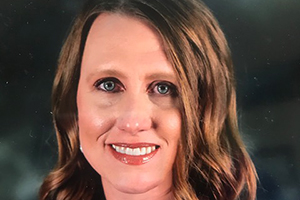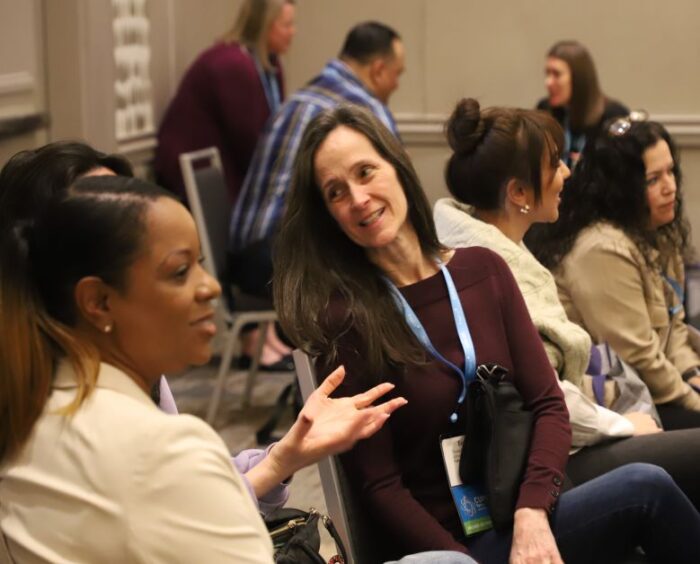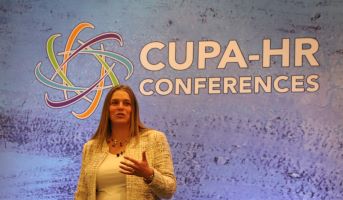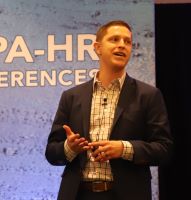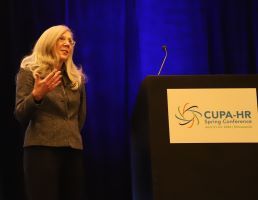by CUPA-HR | May 8, 2024
This blog post was contributed by Jennifer Addleman, director of human resources at Rollins College and 2024-25 chair-elect for the CUPA-HR Southern Region board.
Spring had sprung in Minneapolis, Minnesota, at the CUPA-HR Spring Conference, where more than 400 higher ed HR pros had the opportunity to connect with and learn from some of the brightest HR leaders in higher education. From three dynamic keynotes to 29 interactive concurrent sessions, the conference provided a platform to engage in meaningful discussions, network with peers and gain valuable knowledge to help navigate the dynamic profession of higher ed HR.
The conference was full of aha moments, and here are some of my key takeaways:
- Kris McGuigan, founder and principal owner of Professional Courage, kicked off the conference by sharing tips on leading with purpose and confidence. During her keynote, we had the opportunity to reflect on our own personal values and how they align with change, and reviewed the principle of A.C.E.: acknowledge change, connect to change and embrace failure. Reminding us that there is no perfect time to start, Kris stressed that not changing is still choosing.
- During the first concurrent session, Washington State University’s Paul Fleming McCullagh and Laura Hamilton shared how they created a professional development program for all employees. “If you can dream it, do it!”
- Kevin McClure, Murphy distinguished scholar of education and associate professor of higher education at the University of North Carolina Wilmington, gave a thought-provoking keynote on creating the “caring university.” He warned against toxic positivity and emphasized that creating a culture of care is a shared responsibility of the entire institution, and we reviewed the U.S. Surgeon General’s framework for mental well-being in the workplace. Kevin also suggested that institutions should humanize policies for real people and not ideal worker norms.
- The affinity group lunch provided an opportunity for folks to connect with HR professionals who have similar interests and skills. I met HRIS colleagues who shared their challenges and best practices with systems. Data, data, data!
- Andy Brantley (president and CEO of CUPA-HR), Jazzmine Clarke-Glover (vice president of workplace culture and inclusion at Wagner College), and Helena Rodrigues (senior vice president and chief human resources officer at the University of Arizona) led a roundtable discussion regarding HR’s role in creating inclusive campus communities. How do we reinforce our institutional values by ensuring all employees feel connected and supported? Some comments shared by the group included focusing on outcomes, making your institution a great place to work for everyone, fostering a safe space for challenging conversations, encouraging employees to build relationships, and developing inclusive policies.
- We had the opportunity to network, connect and sing karaoke at the Punch Bowl Social reception, where I learned that we have some talented singers among our profession!
- Keynote speaker Amy Wrzesniewski, William and Jacalyn Egan Professor at the Wharton School of the University of Pennsylvania, shared her research findings on job crafting and what makes our work meaningful. We were able to take a quiz to determine our career, calling, and job scores and how they impact our job satisfaction. Amy also shared that job crafting is an employee-driven activity but should be supported by managers. I left the session reflecting on the question, how I do I make the job my own?
- John Whelan, vice president and CHRO at Yale University, and Michael Rask of Aon described the importance of a strategic plan for HR and how it’s like the sails on the organizational sailboat. They warned against committing to things we can’t deliver and shared that folks appreciate change when it is for them and through them, not to them.
- This was my first time visiting Minneapolis, and I was pleasantly surprised by the art, culture and walkability. Thank you for the hospitality!
- CUPA-HR continues to provide invaluable resources and conference experiences where everyone is willing to help each other and share their expertise. I feel energized catching up with friends I have come to know over the years and meeting new colleagues who share passion for what we do. Thank you to the CUPA-HR team, sponsors and presenters for a great event.
- Finally, Andy Brantley summed up the Spring Conference well: “Your work matters. You matter more.”

